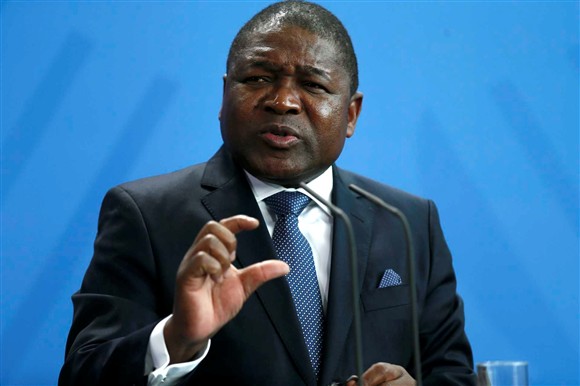Mozambique mulls asking China to rework US$1.4 billion debt after unrest hits economy
IMF cancels payment of second tranche to Mozambique

Lusa / Mozambican president Filipe Jacinto Nyusi
The International Monetary Fund (IMF) has cancelled the US$165 million second tranche payment of a US$286 million loan to Mozambique agreed at the end of last year.
According to an IMF source cited by the Financial Times, the decision was taken following the cancellation of a visit by the IMF delegation to the country this week, during which the payment of second part of the loan agreed last October was expected to be authorized.
“It is probably one of the largest cases of the provision of inaccurate data by a government the IMF has seen in an African country in recent times. They deliberately kept from us at least $1bn, possibly higher, of hidden loans,” the IMF source told the Financial Times.
“Mozambique is close to a financial crisis if the authorities don’t take action to deal with the current risks,” the same source continued, adding that international donors, responsible for financing about 25 percent of the state budget, might also follow the same path and cancel disbursements of US$350 to US$400 million. “Then Mozambique would face both a fiscal and a balance of payments crisis,” concluded the source of the IMF cited by the Financial Times.
Director of the IMF African Department Antoinette Sayeh said the IMF cancelled its visit on Friday because of revelations in the Wall Street Journal about undisclosed loans which came to light during the “tuna bonds” restructuring.
“The loan in question amounts to over one billion US dollars and considerably changes our assessment of Mozambique’s economic prospects,” Sayeh said at the IMF headquarters in Washington.
Contacted by Lusa, Sayeh said the executive may well have been taken by surprise itself, and that it was too early to draw conclusions about the damage to the trust level of donors. “It depends on how things will be managed by both parties,” she said.
Mark Lundell, director of the World Bank to Mozambique, told Lusa that the revelation of a new loan under the Ematum case would increase the risk of excessive debt and affect the resources provided by the institution in the future.
“It is important to remember that Mozambique is a beneficiary country of the International Development Association (IDA) and is rated as moderately at risk of over-indebtedness. Any analysis which lowers debt stability may affect the overall amount of resources available in the coming years,” Lundell explained.
Two weeks ago, shortly after the Mozambican government had successful restructured the state-guaranteed US$850 million 2013 so-called “tuna bonds” loan, the Wall Street Journal reported the existence of a second hidden loan that investors in the Ematum debt securities repurchase operation were not informed about, worth US$622 million.
In the first reaction to the case, the Minister of Economy and Finance of Mozambique, Adriano Afonso Maleiane, denied the existence of hidden loans and said that “there was some confusion” in the financing of Ematum.
“There was some confusion and it ended up putting Mozambique under the spotlight unnecessarily. All that has the state guarantee, is guaranteed. We take over everything that had been taken over by the government. This is the assurance that I continue to give investors,” Maleiane told Lusa on Friday.
Over the weekend, the Mozambican government announced that the prime minister would go to Washington to explain all loans that have not been publicly announced to the IMF.












Leave a Reply
Be the First to Comment!
You must be logged in to post a comment.
You must be logged in to post a comment.